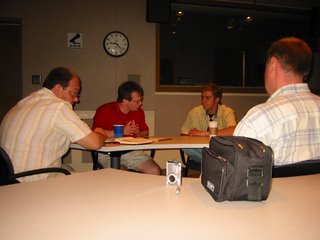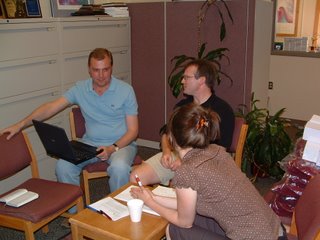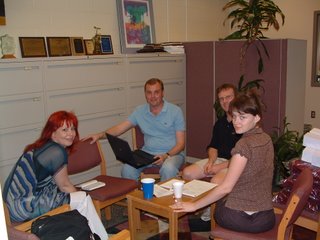Last week I had a wonderful time talking about radio programming strategies--something that I have not been able to talk with someone about for several years at least. Oh, I've taught programming strategies almost every semester for the past 8 years or so...and therefore I've taught the basics to my undergraduates. Unfortunately, in that situation, most of the knowledge is going in one direction. But several days ago I was able to have an in-depth conversation with a Program Director and Disc Jockey who wanted my opinions on strategies they had been considering for an upcoming format change and the accompanying marketing campaign. Usually, I am somewhat cautious about consulting stations that are located nearby the university I work for--because I want to remain impartial and friendly with all my "corporate neighbors". There was very little reason for me to be concerned in this case, however, because the professionals I consulted with were from Radio Mix in
And now, apparently it was WFIU’s turn to return the favor. Several weeks ago I received an e-mail from a station representative, asking me if I wanted to meet with the Radio Mix staff to talk about programming strategies and marketing approaches. I was certainly interested—not only to talk about these issues--but also to have the experience of holding a conversation entirely through interpreters -- as the three people coming from
As the meeting approached, however, I became more concerned about our ability to truly communicate to one another about the intricacies involved in radio programming and marketing. Turns out I should not have been worried. On Monday the 10th I met with Dmitry Zapachshikov, Olena Kotova, and Vyacheslav Ibryaev in a studio in the WFIU facilities. There were two interpreters there (who I’m sorry, I did not get the names of…but to whom I’m very grateful as this experience would have been impossible without them).
The first meeting was 90 minutes long. They wanted to know ways in which I would suggest they market their contemporary formatted music station in their city of over a million people. Although I had read the article from Directions in Sound I had the impression that the radio market was not that competitive. It turns out, that was mistaken, as there are more than 30 stations in the market, and Radio Mix is one of five or so targeting what they called “the 20-35 year old market.”
The first 20 minutes or so were spent with me asking them questions about the market. To give advice without at least trying to understand the specific competitive nuances would not have been good. And, although I still think that some was “lost in translation”, a key element was that their primary competitors in town were all satellite delivered, national formats. Radio Mix was the only station targeting 20-35s that was programmed locally and had local air talent. This similarity to the American radio broadcast industry was interesting -- in fact, a Bloomington/Indianapolis station WTTS has recently been running imaging spots--Obviously targeted toward ClearChannel and other large corporate owners—saying “We’ve been owned by the same man of 30 years…and He’s from Indiana, too.” Or something like that.
So, my first advice to them was to emphasize the fact that they are local and proud to be local. As an interesting side note, the concept of being “proud to be local” originally got translated as "patriotic". To whichVyacheslav responded that not many of the city’s citizens felt all that patriotic toward the city. I stressed that patriotism was not what I was talking about, but rather the station needed to communicate to its audience that they were there, living in Dnepropetrovsk—going to the same clubs they did, aware of what they did on the weekends…and as much as possible having the station be seen at those same places. Since they didn’t have a budget for music research (and their format is CHR…but draws music from all across Europe and the
Here I am at the first meeting with the group from Radio Mix. Of course, the picture shows a great shot of me and the interpreter. And the BACKS of Dmitry Zapachshikov (left) and Vyacheslav Ibryaev (right).
I was really enthused by our first meeting -- and disappointed when it HAD to come to an end because I had my T340 course to teach. Luckily, they found time in their schedule to meet with me again later in the week. This time, I learned that Radio Mix—although currently targeting 20-35—was actually considering focusing their target to 18-24. So, at the second meeting Vyacheslav and Olena and I discussed my recommendations on a number of things concerning the upcoming change. The first thing they wanted to know was whether they needed to change their logo. Apparently, the term “Radio Mix” was set in stone, as in
We talked about hot clocks, and rotations, and jingles and stopsets. All through the interpreters. It was an amazing experience—one which I am very grateful that I was able to be involved in.
Here we are at the second meeting. Vyacheslav and I talking music rotations with the help of one of the interpreters (darn I wish I had written their names down!).
And there, on the left, is Olena Kotova who is an air talent at Radio Mix
I wish them luck and hope that our conversations were as useful to them as they were enjoyable to me.









No comments:
Post a Comment